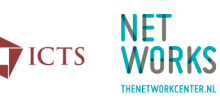The world is opening up again, but I think it's fair to say the organisation of workshops and conferences is not at all back to normal yet.
Scientists realise how deeply they miss the direct interactions with their colleagues around the globe, but many are still reluctant to travel. And many destinations are still hard, if not impossible, to reach.
One could say that the second best thing to meeting each other in person, is to meet each other online. Given that we have spent now almost two years behind our screens, it goes without saying that it's a surrogate for the real thing, often even a very watery surrogate. When you find yourself in a on-line event with tens or hundreds other participants, virtually everybody blocking their cameras, without any opportunity for more personal interaction, this could feel highly alienating, and actually also pretty much pointless.
Still such an online event could be an option that is worth considering. With some extra effort spent on the format, attending the workshop can be a pleasant and rewarding experience. When I started to think about a joint workshop together with my colleagues Nikki Sonenberg and Peter Taylor, we have tried to be as creative as possible. Peter is the director of ACEMS, an Australian program very similar to NETWORKS, and Nikki is postdoc at the Turing institute in the UK.
We felt that arguably the most important ingredient for a successful online scientific event concerns the choice of the topic. It should be about something really timely, a topic a broad set of people want to learn about, and that has the potential to affect many scientists' own research. In the area Nikki, Peter and I are working in -- applied probability and stochastic operations research -- there was one obvious candidate, revolving around the relation between stochastic networks (and in particular queues) and the use of data.
With the increasing availability of empirical data in the operation of large service systems, all kinds of new opportunities arise. Our plan was to let the workshop focus on what this trend means for queueing theory. We did so by bringing together queueing theorists and experts with backgrounds in various adjacent fields, such as statistics, stochastic modelling, data science and control, with the objective to discuss contemporary queueing theory challenges. There are ample challenging research themes, such as the use of online data to design mechanisms that make the network operate more efficiently, the development of statistically sound techniques to infer characteristics of the underlying network from partial observations, and techniques to simultaneously estimate model parameters and optimise network performance.
The workshop worked out really well. Substantial attention was paid to the discussion of future directions in data-driven queueing that arise in modelling, monitoring and controlling queues, and in dealing with parameter uncertainty. A special component in the program was the very vivid panel discussion with two true experts, Peter Glynn (Stanford) and Mor Harchol-Balter (Carnegie-Mellon), moderated by the NETWORKS-PI Sem Borst. It left the feeling that this is a highly exciting new area, that in addition brings us closer together with researchers in surrounding fields, such as statisticians, machine learners, and control theorists.
A special aspect of the workshop was that it covered three continents: Australia, Europe and North America. The consequence is that its sessions spanned a large number of international time zones. We did our best to make sure that all parts of the workshop were scheduled at times maximally convenient to multiple audiences. In addition, we decided to record all presentations, so as to make them accessible to the ones who were getting a well-deserved sleep. With the great help of the NETWORKS and ACEMS support staff teams this went very smoothly.
If you want to know more, you're all invited to have a look at the website of the First Three-Continents Workshop on Data-Driven Queueing Challenges!






